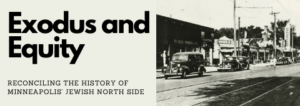This is part of Exodus and Equity: Reconciling the History of Minneapolis’ Jewish North Side, a series exploring how Twin Cities Jews were unwitting participants in racist real estate policies that shape today’s inequality in Minneapolis and other Midwestern American cities. In Minneapolis, that history is predominantly tied to two regions — Near North Minneapolis and St. Louis Park — and centered around civil unrest on Plymouth Avenue, in Near North, in the late 1960s.
——————————
You wouldn’t necessarily expect a Jewish lawyer’s professional organization to be taking deep dives into topics like redlining and covenants that affected the Jewish community at the time, but the effects of which have proven harmful to the African-American community to this day. But since just before quarantine started in March, that’s exactly what the Twin Cities Cardozo Society has done.
Starting with March’s event, where Mapping Prejudice co-founder Kirsten Delegard spoke to a crowd of more than 50, to the one pending re-scheduling with St. Cloud Mayor Dave Kleis on the modern threat of redlining, Cardozo programs have looked at difficult issues — even before the spate of racial justice protests started in Minneapolis this spring.
 “It’s just something [Ben Gerber and I] both care about,” said David Milavetz, who along with Gerber are the programming co-chairs of the Cardozo Society. “We’re both interested in the historical development of our city, and some of the disparities and outcomes for people. You see a lot of injustice that’s still affecting people to this day. And so we felt that it would be great if we could do programs that like actually address important issues and that helped make us more in alliance with other communities.”
“It’s just something [Ben Gerber and I] both care about,” said David Milavetz, who along with Gerber are the programming co-chairs of the Cardozo Society. “We’re both interested in the historical development of our city, and some of the disparities and outcomes for people. You see a lot of injustice that’s still affecting people to this day. And so we felt that it would be great if we could do programs that like actually address important issues and that helped make us more in alliance with other communities.”
Cardozo Society is a joint program of the Minneapolis and St. Paul Jewish Federations. Jeff Prottas, the chief development officer of the St. Paul Federation, said the group’s focus is trying to bring topics to its members that can be looked at through a larger community lens.
“One of the things that Cardozo is trying to do is bring programs of value that’s not just focused on the Jewish community, but the interaction between the Jewish and general communities,” he said. “So we’re bringing topics that we can use to, within that lens, frame a bigger part of the community. We’re not trying to do is bring people together to talk about the Parsha of the week; there’s plenty of opportunities to do that. We’re trying to provide value-added opportunities to expand our Cardozo members and those connected to Cardozo to the broader community.”
Milavetz, who is the president of the board of Jewfolk, Inc., TC Jewfolk’s parent organization, said that these type of sessions that focus on the broader community is an outcome that they are striving towards.
“You have to start making connections somewhere. And we felt this is a good place to start doing that outreach and partnering with other organizations,” he said.
Prottas said that Cardozo partnered with the Minnesota Association of Black Lawyers on a session dedicated to eviction training, and will be looking to partner with the Minnesota Latino Bar Association.
“We’re going to be looking for more strategic partnerships from within the organized legal community, so that we can extend these community-building opportunities as well as the [Continuing Legal Education] credit,” Prottas said. “But it’s really about connecting communities around these issues that are important to everybody. And if we can be the impetus for that in being the collaborator or the convener, even better.
Said Milavetz: “It’s giving people the opportunity to meet that might not have otherwise.”
Prottas said that Cardozo has been running a weekly pro-bono clinic in St. Paul, and is looking to have a presence again in Minneapolis.
“Cardozo has had a commitment to giving back to the community, and they’ve been doing it in ways where they weren’t getting recognized for,” Prottas said. “Through the pro bono clinic, our attorneys have been applying a real-world application to some of these things that we’re now just coming to. And whether it’s the [evictions training] or the ones with respect to redlining or use of force, it is meant to educate and empower and bring people together around these social issues.”
Milavetz said Delegard’s March talk opened a lot of eyes to the reasons behind many of the racial disparities that exist in Minneapolis.
“There is a greater understanding of how disparity really is coming from the way that communities are divided, which happened from the terms of the leases, and also in terms of property ownership and what parents were able to give down to their children,” Milavetz said. “I think having that knowledge of history has helped people to have a better understanding of why you see so many disparate outcomes right now.”
Said Prottas: “When you find reasonable people who are all interested in making sure that our communities are growing in stronger, healthier, evolved ways, I think those partnerships emerge, and you find a lot of commonalities,” Prottas said. “We’re not looking to stir the pot, we’re not looking to ruffle feathers. We’re really looking at community building, and extending these partnerships and creating meaningful relationships where they’re possible.”


